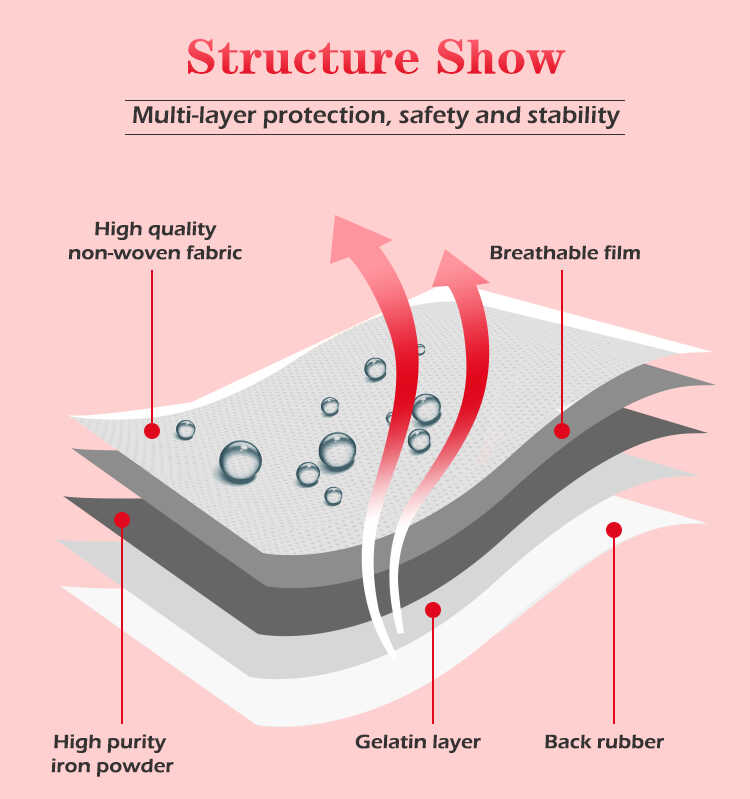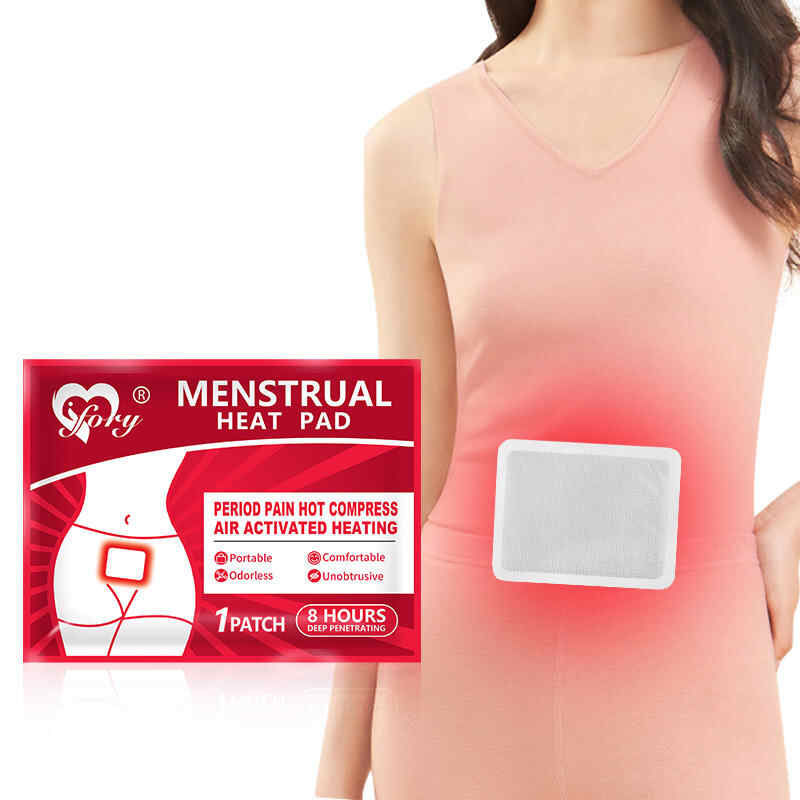Regulatory Compliance in Period Heating Pad OEM: What Every Brand Owner Needs to Know
As demand for safe, effective, and sustainable menstrual care products grows globally, Period Heating Pads have become an increasingly popular solution for women seeking natural pain relief. However, for any brand aiming to enter or expand in this market, regulatory compliance is not optional — it’s essential. Whether you work with a Period Heating Pad OEM or launch your own Private Label Period Heating Pad, understanding the compliance landscape can make or break your business success.
In this article, we’ll explore the crucial aspects of regulatory compliance in Period Heating Pad OEM manufacturing, why it matters, and how choosing the right Period Heating Pad Manufacturer ensures safety, market access, and long-term credibility.

1. Why Regulatory Compliance Matters in the Period Heating Pad Industry
Regulatory compliance ensures that products are safe, effective, and trustworthy. For Period Heating Pads, which come into direct contact with the body and generate heat to alleviate menstrual cramps, safety regulations are even more critical.
Key Reasons Compliance Is Crucial:
Consumer Safety: Compliance ensures that the heating pad’s temperature, materials, and adhesives are safe for skin contact and prolonged use.
Market Access: Without meeting specific certifications like CE (Europe) or FDA registration (U.S.), your Custom Period Heating Pad cannot legally enter or be sold in those markets.
Brand Reputation: Non-compliant products can lead to recalls, fines, or even bans—damaging a brand’s image permanently.
Liability Protection: Compliance reduces legal risks associated with product malfunctions, allergic reactions, or skin burns.
In short, for any brand owner, ensuring compliance from the early design stage through manufacturing and labeling protects both your customers and your company.
2. Understanding the Regulatory Framework for Period Heating Pads
The global compliance landscape for Period Heating Pads depends on where the product is sold. Below are some key regulatory standards and certifications to consider:
2.1. FDA Compliance (United States)
In the U.S., the Food and Drug Administration (FDA) classifies most heating pads as Class II medical devices. Therefore, Period Heating Pad Manufacturers must:
Follow Good Manufacturing Practices (GMP) under the FDA’s Quality System Regulation (QSR).
Register and list their facility and devices with the FDA.
Conduct biocompatibility testing to confirm material safety.
Provide labeling that includes usage instructions, warnings, and company identification.
2.2. CE Marking (European Union)
For brands targeting the European market, CE certification is mandatory. It verifies that your Period Heating Pad OEM products comply with EU health, safety, and environmental requirements.
The Medical Device Regulation (MDR 2017/745) applies to products intended for medical use. Depending on the pad’s design (e.g., whether it uses electricity or chemical heating), different categories and testing standards may apply.
2.3. ISO Certifications
A professional Period Heating Pad Supplier typically complies with:
ISO 13485: Quality management system for medical device manufacturing.
ISO 10993: Biocompatibility testing for materials in contact with human skin.
ISO 9001: General quality management for consistent product quality.
2.4. RoHS and REACH Compliance
Environmental and chemical safety standards such as RoHS (Restriction of Hazardous Substances) and REACH (Registration, Evaluation, Authorization and Restriction of Chemicals) are critical for eco-friendly manufacturing. They ensure that your Custom Period Heating Pad is free from harmful substances like lead, mercury, and phthalates — aligning with consumer demand for sustainable menstrual care solutions.
3. The Role of a Period Heating Pad OEM in Compliance Management
When you collaborate with a Period Heating Pad OEM, you’re not just outsourcing production — you’re partnering with an expert who understands regulatory complexities. A reliable OEM ensures that your brand’s products meet all local and international standards.
3.1. Product Safety Testing
A compliant Period Heating Pad OEM conducts multiple safety tests:
Temperature stability and consistency.
Adhesive skin compatibility.
Thermal and electrical safety (for electric pads).
Chemical composition analysis.
These tests confirm that the product performs safely over repeated use, meeting requirements for both regulatory bodies and end-users.
3.2. Documentation and Technical Files
An experienced Period Heating Pad Manufacturer provides comprehensive technical documentation, including test reports, material certifications, and safety data sheets. This documentation is vital for regulatory submissions, inspections, and audits.
3.3. Quality Assurance During Production
OEMs that follow ISO 13485 and GMP ensure every production batch meets the same high standards. From raw material inspection to final packaging, quality control checkpoints maintain consistency and compliance.
3.4. Support for Certification Applications
Top-tier Period Heating Pad Suppliers often assist brand owners in preparing and submitting applications for CE marking, FDA registration, or other certifications. This support saves time and helps smaller brands enter new markets with confidence.
4. Compliance Considerations When Developing a Custom Period Heating Pad
Customization is one of the biggest advantages of working with a Period Heating Pad OEM. However, custom design choices — from heating mechanisms to packaging — must still meet compliance requirements.
4.1. Materials and Formulation
If your Custom Period Heating Pad includes natural ingredients (such as iron powder, activated charcoal, or herbal components), ensure that all substances are non-toxic and approved for dermal use. The OEM Manufacturer should provide testing to verify the safety of each ingredient.
4.2. Adhesive Layer Safety
Since heating pads adhere directly to the skin, adhesive composition must pass biocompatibility and sensitivity tests under ISO 10993 standards to prevent irritation or allergic reactions.
4.3. Labeling and Instructions
All Private Label Period Heating Pads must include proper labeling:
Product name and purpose
Instructions for use
Warnings and contraindications
Manufacturer or distributor contact details
Certification marks (CE, FDA, ISO, etc.)
Regulatory authorities may reject products lacking compliant labeling, even if the formulation is safe.
4.4. Environmental Claims
If your brand markets an eco-friendly Custom Period Heating Pad, claims such as “biodegradable,” “sustainable,” or “non-toxic” must be substantiated by testing or certification (e.g., SGS, RoHS). Misleading green claims can lead to penalties and loss of consumer trust.
5. The Importance of Working with a Certified Period Heating Pad Manufacturer
Not all OEMs are equal. Partnering with a certified Period Heating Pad Manufacturer ensures that compliance and quality are built into every step of production.
5.1. Proven Regulatory Track Record
Choose an OEM that has experience producing for regulated markets like the U.S., EU, and Japan. These manufacturers are already familiar with global standards and can streamline certification processes for your brand.
5.2. Transparent Supply Chain
A trustworthy Period Heating Pad Supplier provides full traceability — from raw materials to final products. This transparency not only ensures compliance but also boosts brand credibility and consumer confidence.
5.3. Continuous Improvement
Leading OEMs regularly update their technologies, materials, and testing methods to align with evolving regulations. Their proactive approach ensures that your brand remains compliant even as standards change.
6. Common Compliance Pitfalls and How to Avoid Them
Even experienced brand owners can face compliance challenges. Here are common pitfalls and how to avoid them when working with your Period Heating Pad OEM:
| Pitfall | How to Avoid It |
|---|---|
| Incomplete documentation | Request all certifications, testing reports, and safety data sheets before launch. |
| Unverified material sources | Partner only with OEMs who use traceable, certified suppliers. |
| Non-compliant labeling | Have regulatory experts review your packaging and instructions. |
| Misleading product claims | Back every performance or environmental claim with lab data. |
| Skipping product testing after design changes | Always re-test modified products before release. |
Compliance should be an ongoing process — not a one-time checklist.
7. How to Choose the Right Period Heating Pad OEM for Compliance Confidence
Selecting the right Period Heating Pad OEM partner is one of the most critical business decisions for your brand. Here’s what to consider:
7.1. Certification Portfolio
Look for OEMs with FDA registration, CE certification, ISO 13485, and RoHS compliance. These prove they meet international quality and safety standards.
7.2. Customization and Regulatory Support
The ideal OEM should not only offer Custom Period Heating Pad solutions but also provide guidance on testing, labeling, and documentation required for different markets.
7.3. R&D Capabilities
Advanced R&D allows OEMs to develop innovative and compliant heating technologies — for example, adjustable heat duration or biodegradable materials — helping your Private Label Period Heating Pad stand out.
7.4. Quality Control Infrastructure
Visit the OEM’s factory or request a virtual audit to assess their quality management system, cleanroom standards, and inspection procedures.
7.5. Communication and Transparency
A professional Period Heating Pad Supplier maintains open communication, promptly shares test results, and explains compliance implications clearly. This transparency helps your brand make informed decisions.
8. The Future of Regulatory Compliance in Period Heating Pad Manufacturing
As the menstrual care industry evolves, so do regulatory expectations. Authorities are increasingly focusing on:
Sustainability: Encouraging eco-friendly materials and recyclable packaging.
Data and Traceability: Implementing digital tracking for product batches.
Consumer Transparency: Requiring clear labeling for ingredients and safety testing.
Brands that partner with forward-thinking Period Heating Pad Manufacturers will be better positioned to adapt and thrive in this changing regulatory landscape.
9. Final Thoughts: Compliance as a Competitive Advantage
For many brand owners, compliance might seem like a burden — but in reality, it’s a business advantage. By ensuring your Private Label Period Heating Pad meets international standards, you:
Build consumer trust
Expand your global market reach
Minimize legal risks
Strengthen your brand’s reputation
Working with an experienced Period Heating Pad OEM that prioritizes compliance and quality allows your brand to focus on what truly matters — delivering safe, effective, and sustainable menstrual care products to consumers worldwide.
10. Related Questions and Answers
Q1: Why is FDA or CE certification important for Period Heating Pads?
Because these certifications verify that the product meets health, safety, and quality requirements necessary for legal sale and consumer protection in the U.S. and EU markets.
Q2: Can I sell a Private Label Period Heating Pad without certification?
Not legally in regulated markets. Certifications like FDA or CE are required for product registration and import approval.
Q3: What documents should a compliant Period Heating Pad Manufacturer provide?
Technical files, safety test reports, material data sheets, ISO certifications, and labeling templates.
Q4: Are eco-friendly heating pads subject to the same regulations?
Yes. Even if marketed as natural or sustainable, Custom Period Heating Pads must meet the same safety and labeling standards as conventional ones.
Q5: How can I verify if my Period Heating Pad OEM is compliant?
Request copies of their certifications, audit reports, and third-party testing results. You can also verify registration numbers on regulatory databases.






